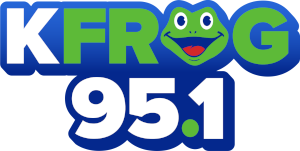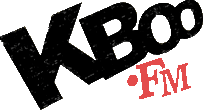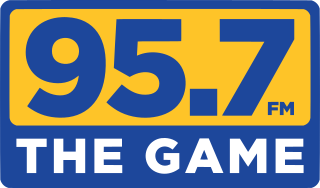
KCBS-FM is a commercial radio station in Los Angeles, California, serving Greater Los Angeles. It is owned by Audacy, Inc., and broadcasts an adult hits music format branded "93.1 Jack FM".

KDLD is a commercial FM radio station in Santa Monica, California, broadcasting to the Greater Los Angeles area on 103.1 MHz. KDLE is a commercial FM radio station in Newport Beach, California, broadcasting to the Orange County area on 103.1 MHz.
KOGO is a commercial AM radio station in San Diego, California. The station airs a news/talk radio format and is owned by iHeartMedia, Inc. The studios and offices are located in San Diego's Kearny Mesa neighborhood on the northeast side.

KFRG is a commercial radio station licensed to San Bernardino, California, and broadcasting to the Riverside-San Bernardino-Inland Empire radio market. KFRG airs a country music radio format calling itself "K-FROG" and is believed to be the original "Frog" station under previous owner Keymarket. The brand name has been subsequently licensed by Keymarket to dozens of American radio stations.

KBOO is a non-commercial, listener-supported, community radio station in Portland, Oregon. It airs an eclectic radio format, with a small paid staff and scores of volunteers. The studios are on SE 8th Avenue, in a converted warehouse in inner Southeast Portland, purchased in 1982. The mission is to serve groups that are underrepresented on other local radio stations and to provide access to the airwaves for people who have unconventional or controversial tastes and points of view.

KVVF is a commercial radio station licensed to Santa Clara, California, and is simulcast on 100.7 KVVZ San Rafael. They are owned by Univision Communications, with studios at 1940 Zanker Road in San Jose. They serve the San Francisco Bay Area with a Spanish CHR radio format, using the slogan "Reggaeton y más." KVVF and KVVZ are the San Jose affiliates for the Uforia Audio Network.
KLVM is an FM radio station broadcasting a Contemporary Christian music format. Licensed to Santa Cruz, California, United States, the station is an affiliate of the K-LOVE Christian music radio network and is owned by Educational Media Foundation. The signal covers much of California's Central Coast.
KSER is a non-commercial radio station and airs a mix of music and news/public affairs. The station, which is owned and operated by the non-profit KSER Foundation, broadcasts at 90.7 MHz with an ERP of 5.8 kW and is licensed to Everett, Washington.
KBAY is a commercial radio station licensed to Gilroy, California, serving San Jose and the San Francisco Bay Area, and broadcasting a country music radio format. KBAY is owned by Alpha Media, along with sister station 106.5 KEZR. The radio studios and offices are located off U.S. Route 101 and Hellyer Ave in South San Jose.

KWAI is a non-commercial FM radio station licensed to Los Altos, California, owned by the Educational Media Foundation. Its transmitter is located near Cupertino, California. It is the San Jose affiliate for the Air1 religious network. No local programming originates from the station, and it carries network programming full-time. KWAI's transmitter is located near Stevens Creek Reservoir.
KLIV is a broadcast radio station in the United States. Licensed to San Jose, California, KLIV serves San Jose and the Santa Clara Valley with a Vietnamese format simulcasting KVVN. It is one of the last independently owned stations in the Bay Area.
KCHU is a non-commercial radio station in Valdez, Alaska, United States. Through its main transmitter, two full-service FM stations, and two translators, the station covers an area the size of the state of Ohio, but with a population just over 10,000.
KRAB is a commercial FM radio station licensed to Greenacres, California, and broadcasting to the Bakersfield metropolitan area. The station airs an alternative rock radio format and is owned by iHeartMedia, Inc. KRAB carries The Woody Show in morning drive time, syndicated from KYSR Los Angeles. KRAB's studios are on Mohawk Street in southwest Bakersfield.

KGMZ-FM is a sports radio station licensed to San Francisco, California, and serving the San Francisco Bay Area. The station is owned by Audacy, Inc., and broadcasts from studios on Battery Street in the North Beach section of San Francisco. KGMZ-FM serves as the flagship station for the Golden State Warriors basketball team. The station also broadcasts games of the Bay Area Panthers indoor football team.
KDFG is a non-commercial classical music radio station in Seaside, California, broadcasting to the Santa Cruz-Carmel-Salinas, California, area on 103.9 FM. Owned by the University of Southern California, the station broadcasts a classical music format as a full-time simulcast of KDFC in San Francisco.
KMVQ-FM is a commercial radio station licensed to San Francisco, California. It is owned by Salt Lake City–based Bonneville International, and broadcasts a contemporary hit radio format branded 99.7 Now. KMVQ-FM's studios are located in Daly City.

KTAO is a solar-powered FM radio station licensed to serve Taos, New Mexico. The station is owned by Taos Communications Corporation. It airs an adult album alternative music format. The station was assigned the KTAO call letters by the Federal Communications Commission on October 6, 1986. The station is an affiliate of the syndicated Pink Floyd program "Floydian Slip."
Lorenzo Wilson Milam, born on August 2, 1933, in Jacksonville, Florida; died on July 19, 2020, in Puerto Escondido, Oaxaca, Mexico, was an American writer and activist who was instrumental in starting many of the first listener-supported community radio stations in the United States, beginning with KRAB in Seattle in 1962.








